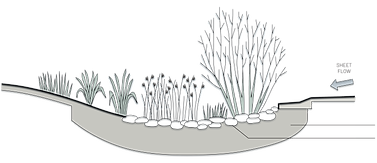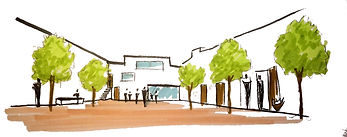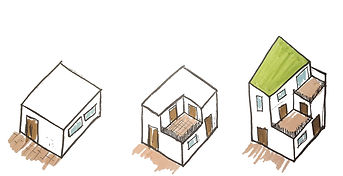
The Beqaa Valley, renowned for its distinctive ecosystem and being Lebanon's largest cultivable expanse, has faced vulnerability due to regional instability. Amid ongoing Syrian events and insufficient support for agriculture, the valley has become a refuge for displaced individuals seeking fertile but neglected lands. This study delves into the social and economic dimensions of livelihoods in Bar Elias, an overlooked town within the valley, through the prism of agricultural land and refugees. By harmonising human habitation, services, and existing organic structures, Bar Elias aims to evolve into a resource for the region, fostering self-sustaining food production and farmer-driven development. The envisioned low-rise urban fabric unites agriculture, water, and community, while a flexible, foldable structure adapts to weather variations. Beyond buildings, the living space encompasses rooftops, terraces, squares, and pathways, offering an interconnected environment.
Bar Elias aspires to embody a diverse tapestry of services and uses, enabling both residents and visitors to experience decentralised hospitality and exploration. The landscape transformation embraces ecological transition, welcoming biodiversity and sustainable production in the valley's rivers and fields. Living spaces merge seamlessly with nature and farming, weaving community gardens, gathering spaces, commercial areas, and more into a cohesive mosaic. The economy embraces closed cycles, minimising material loss and leveraging domestic waste for soil revitalisation. Agriculture and forestry coalesce, yielding a wider range of products and increased job opportunities, contributing to Bar Elias' journey towards self-sufficiency.































provisions for vegetated swales
provisions for water-collecting gardens and paths
curb-cut and backwater
river front ans ecological and social bond
industrial sites 'filtered' from river front
agriculture and water: a place for the people













overview




ecology
and living spaces

economic boost
conclusion
there was a valley
back in time
that served corn and barley
potato, wheat and thyme
a long forgotten small village there:
bar elias, it was poor and in despair
it was neglected, spurn and miserable
refugees took over, and made it more visible
a side story on that concern
about syrian refugees who can't return
to their own country, now at war
they live in bad conditions, sleep on the floor
in tents of plastic, far from human rights
they struggle to find sleep throughout their nights
agriculture fields are spread in the territories
cultivating crops from a few categories
refugees were placed on top of fertile lands
for people, though in need, stopped working with their hands

the proposal is there to ensure life gets better
for agriculture in lebanon needs to be an up-setter
and people who live in the valley now
are the ones to whom the masses should bow
they brought back life to the lands that were rotten
and they are the new farmers who will not be forgotten
agriculture itself will be transformed
from the traditional form to which it conformed
it will turn towards the 21st century
with more diversity, with more forestry
once the environment is put on the right track
and the people living there are not held back
the economy will know an advancement and a boost
farming will be major, and the tourism reduced
bar elias, therefore, is intended to become
a leading example for the years to come
a place where humans and landscapes can be
of the highest importance and to development key
- myriam el khoury
